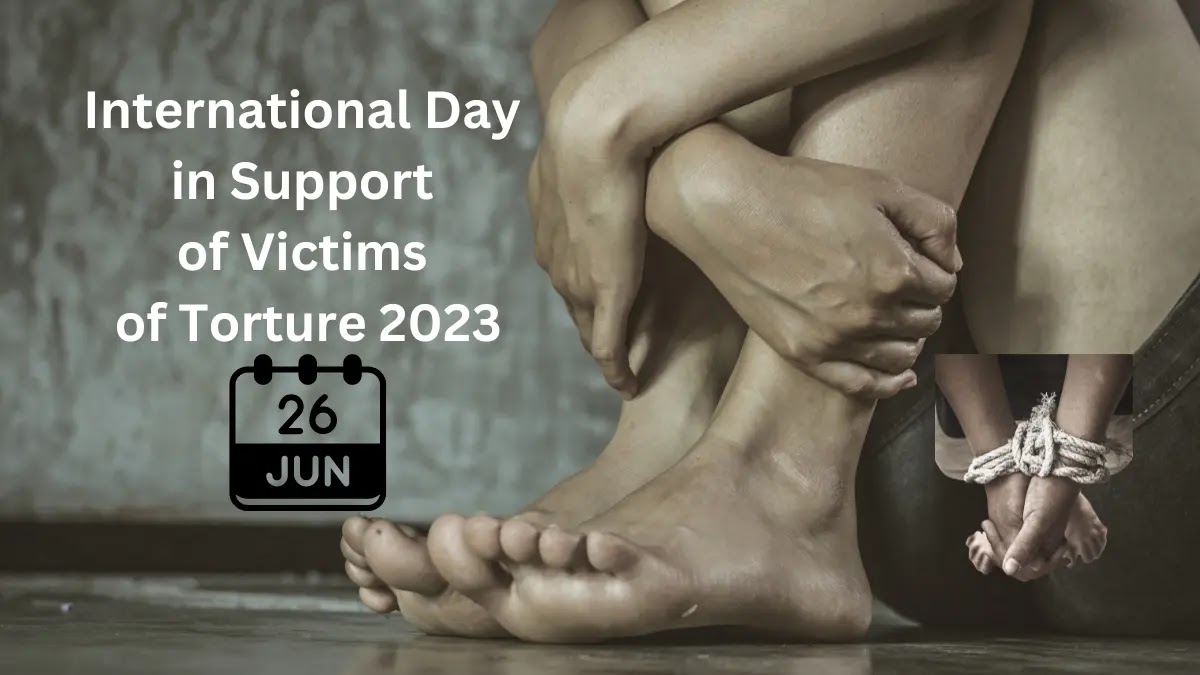International Day in Support of Victims of Torture: Advocating for Healing and Justice
June 26th is observed as the International Day in Support of Victims of Torture, a significant date that highlights the importance of advocating for healing and justice for those who have experienced the unimaginable horrors of torture. This annual observance serves as a reminder of the urgent need to eradicate torture worldwide and support survivors on their path to recovery. In this article, we will explore the impact of torture on individuals and societies, shed light on the significance of the International Day in Support of Victims of Torture, and discuss the crucial role of healing and justice in the recovery process.
I. Understanding the Reality of Torture
- Defining Torture: A Universal Crime Against Humanity
- The Pervasive Nature of Torture: From Past to Present
II. The Consequences of Torture: Physical, Psychological, and Societal
- Physical and Psychological Trauma: The Lingering Effects
- Social Stigma and Isolation: The Hidden Wounds
III. The International Day in Support of Victims of Torture
- Commemorating a Global Effort: The Origin and Significance
- Raising Awareness: Uniting Against Torture
IV. Advocating for Healing: A Path to Recovery
- Recognizing the Importance of Rehabilitation and Support
- Holistic Approaches: Combining Medical, Psychological, and Social Support
V. Pursuing Justice: Holding Perpetrators Accountable
- Legal Frameworks and International Instruments
- Breaking the Cycle: Preventing Torture and Ensuring Accountability
International Day in Support of Victims of Torture: Advocating for Healing and Justice
I. Understanding the Reality of Torture
Torture is an egregious violation of human rights that has plagued societies throughout history. Defined as the deliberate infliction of severe physical or psychological pain by individuals in positions of power, torture is universally recognized as a crime against humanity. From ancient times to modern conflicts, the use of torture has persisted despite global efforts to eradicate it.
Torture takes various forms, including beatings, electrocution, sexual violence, and psychological manipulation. It aims to instill fear, break the spirit, and exert control over its victims. The practice is not limited to specific regions or political regimes; it transcends borders, affecting individuals from all walks of life.
II. The Consequences of Torture: Physical, Psychological, and Societal
The aftermath of torture is deeply traumatic, leaving enduring physical and psychological scars on survivors. Physically, victims often suffer from broken bones, internal injuries, and chronic pain. However, the psychological impact is equally devastating, with many experiencing post-traumatic stress disorder (PTSD), depression, anxiety, and nightmares.
Moreover, the consequences of torture extend beyond the individual survivor. Societies that condone or overlook torture are plagued by a culture of fear and silence. Communities become divided, trust erodes, and the social fabric weakens. Survivors often face stigmatization, ostracization, and isolation, exacerbating their suffering and impeding their reintegration into society.
III. The International Day in Support of Victims of Torture
On June 26th, the International Day in Support of Victims of Torture brings global attention to the plight of survivors and the urgent need for healing and justice. Established by the United Nations General Assembly in 1997, this annual observance aims to raise awareness about the ongoing struggle against torture and advocate for the rights and well-being of survivors worldwide.
The International Day serves as a platform to denounce torture, support survivors, and promote solidarity among nations. It provides an opportunity to galvanize governments, civil society organizations, and individuals to join forces in combatting this heinous crime. By shining a light on the issue, the day encourages dialogue, mobilizes resources, and fosters a collective commitment to eradicate torture.
IV. Advocating for Healing: A Path to Recovery
Healing is an essential aspect of supporting torture survivors on their path to recovery. Recognizing the significance of comprehensive rehabilitation, it is crucial to provide survivors with specialized medical, psychological, and social support. Rehabilitation programs should be holistic, addressing both physical and psychological needs, and tailored to individual circumstances.
To facilitate healing, survivors require access to quality healthcare services, including physical therapy, pain management, and specialized trauma counseling. Additionally, social support systems are crucial in helping survivors reintegrate into society, rebuild their lives, and regain a sense of dignity. These support networks can include vocational training, legal aid, and assistance with housing and employment.
V. Pursuing Justice: Holding Perpetrators Accountable
To ensure a future free from torture, it is vital to hold perpetrators accountable for their actions. International law provides frameworks and mechanisms for seeking justice and prosecuting those responsible for torture. Instruments such as the United Nations Convention against Torture and Other Cruel, Inhuman or Degrading Treatment or Punishment establish a legal basis for combating torture globally.
Efforts to prevent torture should focus on strengthening legal systems, promoting transparency, and fostering a culture of accountability. This involves training law enforcement officials, establishing independent oversight mechanisms, and encouraging the reporting of torture incidents. By addressing the root causes and implementing preventive measures, societies can break the cycle of torture and safeguard human rights.
In conclusion, the International Day in Support of Victims of Torture serves as a critical reminder of the ongoing struggle against torture and the urgent need for healing and justice. By understanding the reality of torture, acknowledging its profound consequences, and advocating for rehabilitation and accountability, we can collectively work towards a world where no individual suffers the horrors of torture. Let us stand united in supporting survivors, raising awareness, and advocating for policies that promote healing, justice, and respect for human rights. As we commemorate this day, let us reaffirm our commitment to creating a future where torture is eradicated, and the dignity of every individual is upheld.



